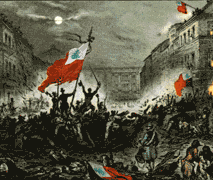 |
TODAY Thursday 26 March 1998 Each weekday. Conn Nugent on what's new in the world, on the site. |
newsroom
 |
TODAY Thursday 26 March 1998 Each weekday. Conn Nugent on what's new in the world, on the site. |
TODAY IN THE WORLD: Hungary
Exactly 1100 years ago, a collection of pastoral tribes, all speaking a strange non-Indo-European language, left their homes near the Ural Mountains and headed west. Expert horsemen, they were particularly adept at shooting arrows from the saddle. They brushed aside thin populations of Slavs and settled in one the world's most fertile food-production zones, a vast basin neatly demarcated by the spine of the Carpathian Mountains. That basin is now known as the Great Hungarian Plain. The conquerors of 898, who called themselves Magyars (say MAWD-yawrs, more or less), named it Magyarorszag, that is, Magyar-land.
The Magyars were small in number and so tolerated and even invited non-Magyar populations to help settle their vast realm. Romanians, Germans, Slovaks, Croats, and Poles developed distinct communities, though under the suzerainty of the Magyar king. By 1919, when the Kingdom of Hungary was partitioned by the Allies, Magyar and non-Magyar populations were about equal in number. [Among those who spoke Hungarian and considered themselves Magyar were the Jews of Budapest, a community that might be described as the smartest bunch of people who ever lived. You can't imagine either 20th Century physics or classic Hollywood movies without them.]
Anyway, Hungary lost two-thirds of its territory through the treaties that ended the First World War. But the core which was left had the virtue of containing the best of the agricultural lands, and it was now occupied by a gifted population all speaking the same inscrutable language. Today more than half of Hungary consists of arable land; the soils are rich, deep, and well-watered. And into the fertile countryside flow government agricultural subsidies of about $500 million per year. Farm exports provide 13 percent of the nation's foreign exchange.
And therein a problem, because Hungary is dying to be admitted into the European Union and the farmers living in the current member-states of the EU are not dying to share their cozy system with their cheap-labor, cheap-land Magyar counterparts. And as French and German farmers cope with reductions in the massive EU agricultural payouts, they certainly don't like the idea of tolerating special subsidies for new applicants to the club who have the nerve (as the Hungarians do) to prohibit ownership of farmland by foreigners.
Plus there's the issue of the environment. Hungarian farm practices incline towards the chemically-intensive; pesticides and herbicides are applied copiously. As western Europe struggles to devise and enforce more stringent uniform standards regulating chemical use, Hungarian farmers will either have to fall into line or seek yet another exemption that the senior EU members will not be inclined to grant.
Agriculture is just one part of the overall problem of changing bad Stalin-era habits to conform to EU demands for high standards of environmental protection. In a Reuters dispatch from Planet Ark yesterday, Michael Roddy reports that three-quarters of Budapest's sewage goes directly into the Danube, that 600 tons of mercury are buried near a giant chemical complex, and that there about 10,000 illegal waste dumps scattered throughout the countryside. These are enormous infrastructural challenges for a now-small nation struggling to make it in the brave new world of the global market. Good thing they're smart.
TODAY ON THE SITE
Don't forget that we have a great place on this site for learning how to learn more about environmentalism in Europe. Marianne Ginsburg and Jennifer Mitchell tell you the five best websites to begin your Grand Tour. All available in our High Fives section.
Recent "Today" columns:
3/25: Solidarity With Counterfeiters
3/24: A Fair Price for Water
3/23: Unattractive Progress on Transportation
3/20: The Thrill of Demography
3/19: About This Global Economy Business...
3/18: Toilet Heresy
3/17: St Patrick and Your Asteroid Insurance
3/16: Rebellion in Tennessee
3/13: Good News from the Senate
3/12: Children and Cancer
3/11: Save Our Beaches!
3/10: Die Gruenen und der SDP
3/9: In Search for the Holy Grail of the Forests
3/6: My Doom, Your Gloom
3/5: The Great D. P. Moynihan
3/4: "An Earthquake in Insurance"
3/3: Salmon Farming
3/2: Our Friends the Duck Killers
2/27: Trust El Nino
2/26: That Darn Triple-A
2/25: Cutting a Deal on Endangered Species
2/24: Fire? Again?
2/23: Garbage
2/20: Population Rebellion in the Sierra Club
2/19: The Trouble With Cattle
To access more "Today" columns, click "Archives" below.